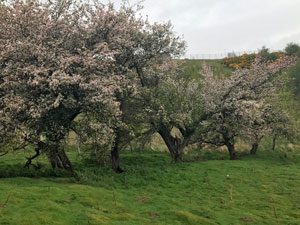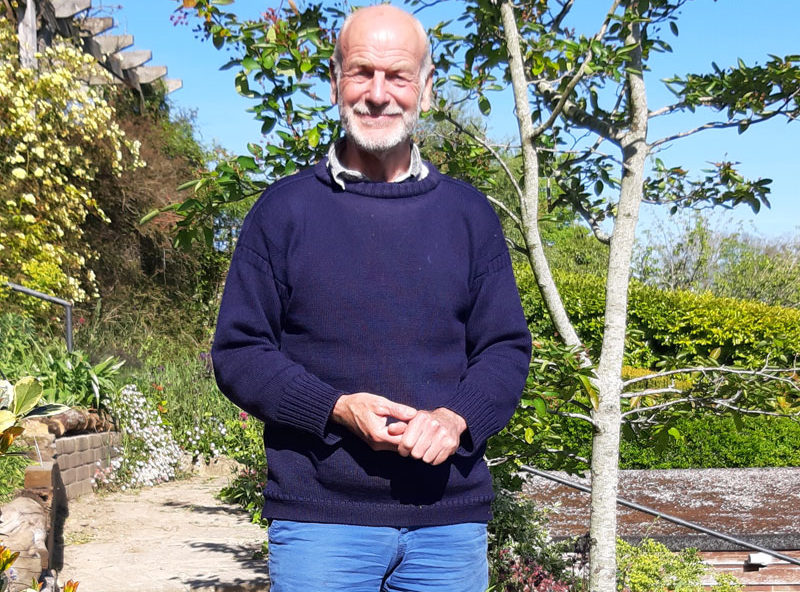Not many of us could say that we have our dream job and would never want to do anything else but that is how the interview started with John Tucker, Director of Woodland Creation at the Woodland Trust. Despite a long career in forestry, he is both surprised and pleased about the current mood change which has caused him to be busier than ever.
With landowners concerned by the uncertainty of Brexit and Extinction Rebellion, amongst others, raising an awareness of the threat of climate change, there is now a greater interest in conservation, diversification, soil management and preservation of wildlife. These changes in attitude are, he says, leading to real innovation in the world of farming and woodland but there is still much more to be done.
John has lived in Rye for 26 years with his wife Sorrel and his three children, two of whom went to Rye College. He grew up on a dairy farm in Cornwall and his interest in trees was sparked by a young lad who came to work on the farm and whose love of trees inspired him. He gained a forestry degree at Bangor University, and spent six years in Scotland working in the forestry and arboricultural sector.
In 1987, he moved to Hastings and worked for the Borough Council as their arboricultural officer. Soon after his arrival, southern England was hit by the October storm which devastated heavily treed areas of the town, notably Alexandra Park and the crematorium. Clean-up operations and new planting kept him very busy.
In the early 90’s, John was offered a travelling scholarship to America for six weeks, where he studied urban forestry and that was followed, several years later, by a month in Israel studying arid land forestation. Seeking to broaden his tree horizons, John was offered a job with the Woodland Trust in 1995, where he has worked in a variety of roles ever since.

John’s current role, as Director of Woodland Creation, involves travelling around the UK talking to a range of partners to inspire and help them plant more trees and woodland. Partners range from individual farmers, schools and communities to groups such as the Crofting Federation in Scotland, water companies and the MoD, a large landowner. A lot of time is spent highlighting the role of trees and woods in both urban and rural settings where they can contribute to urban cooling, provide shade and shelter, minimise the run-off from fields, and reduce the impact of flooding. Street trees, trees in hedgerows, and small copses or shelter belts all contribute to creating more resilient landscapes.
He enthuses about some of the Trust’s long-term partners such as Sainsbury’s where proceeds from their sale of free range eggs has brought in substantial funding as well as benefiting animals, farmers and partners. Studies of typical free range farms show that often only a minority of birds make full use of their range. Well-designed tree planting encourages better use of the range by providing cover, shelter and shade.
From the farmer’s perspective, integrating trees into free range poultry farming encourages ranging and other natural behaviours in their flocks. This leads to improvements in animal health and welfare, as well as production.
Landowners concerned about the loss of income from the EU, changing payment systems, tariffs and cheaper imports from outside the EU have led them to think about different ways of farming. He has seen real growth in agro-forestry – combining trees and farming, which can increase productivity, diversify farm businesses, protect soils from erosion, store carbon, increase habitat for pollinators and act as a natural flood defence.
He is currently working with the Scottish government and the Crofting Federation who want to restore underused croft land. He says that crofters increasingly see the merits of shelter belts, protecting buildings, crops and livestock. Outdoor lambing mortality rates, for example, can be reduced by providing additional shelter through new woods and hedges. As a result of new thinking and innovative ways of working, he said that we will definitely see changes in our landscape, particularly farming.

John’s media business partnerships have taken him to places he had never dreamed of. He was recently asked to address a panel of the Archers at the BFI which was asked “is it the greenest radio programme ever”. He has advised on story lines and even wrote a blog for Brian Aldridge of the Archers. Princess Anne has been a patron of a number of major projects of the the Trust, so he could be at Buckingham palace or Windsor castle one moment, on a croft in the wilds of Scotland in another, or exploring the planting of apples trees in hedgerows in Cumbria. His enthusiasm and excitement about the endless possibilities to find new ways to improve the environment are infectious.
The mood around trees, woods and the environment has changed significantly in recent times. A recent report from the Climate Change Committee has called for a significant increase in woodland planting in the UK from the current average of around 8,000 hectares per annum to in excess of 30,000 hectares. The Woodland Trust will have a significant role in helping achieve this but everyone of us can do something to help.
How can we help?
Asked what we can do to help he suggested:
- Plant a tree – free tree packs are available for schools and communities which the Community Garden made use of.
- Identify areas in Rye which might benefit from a few trees. Be more aware of the environment about us.
- Get children involved. Children can join the Nature Detectives on the Woodland Trust website and get access to crafts and nature activities
- Walk in the local woods – Brede for example had a wonderful display of bluebells
- Become a member of the Woodland Trust. There are currently around 250,000 members but new members are always welcome.
For information on all of the issues raised above see the Woodland Trust website.
The government announced new funding for planting trees this week.
Image Credits: Dee Alsey , John Tucker .



